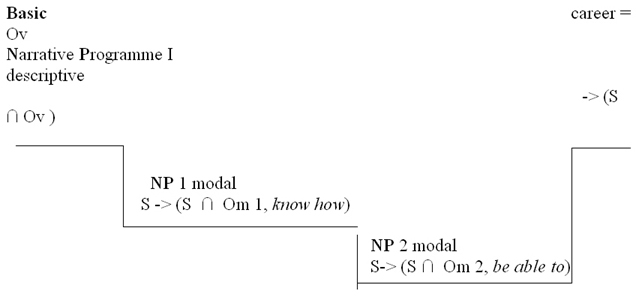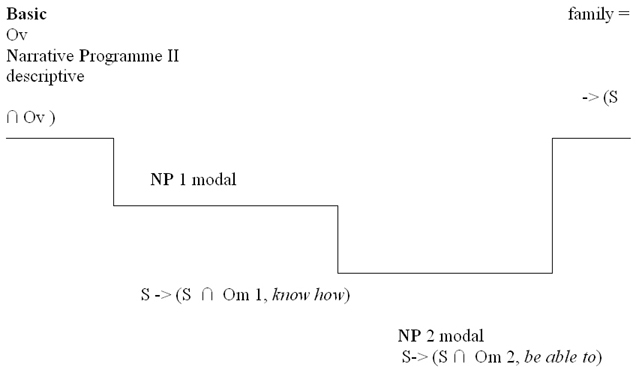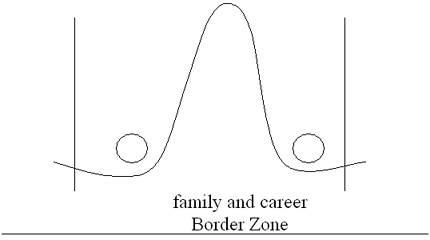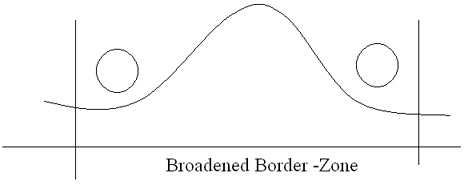
| Trans | Internet-Zeitschrift für Kulturwissenschaften | 16. Nr. | Juli 2006 | |
|
5.6. Border Zones: Travel, Fantasy and Representation Herausgeberin | Editor | Éditeur: Ludmilla Kostova (University of Veliko Turnovo, Bulgaria) |
||||
Elissavet Evdoridou (University of Thessaly, Greece) [BIO] /
Theodoros Karakasidis (University of Thessaly, Greece) [BIO]
Gender and women’s roles in present-day society have been repeatedly examined. Certain studies have focused on the diachrony of statistical data, whereas others have considered working women and the increase of employment opportunities for women in a number of countries. Issues of feminism and mainstream legislation or policies, in or out of the European Union, as well as in individual member states have already been the object of extensive research conducted either by public organizations or by individuals. However, a bibliographical search has revealed the absence of a semiotic analysis focusing on a specific group of women and analyzing the replies of a representative sample. This is perhaps due to the fact that such a study would be very complex, almost "chaotic", because of the variety of lexemes to be analyzed and the number of the statistical and semiotic variables emerging from the lexemes in use. The present study focuses on Greek women’s double role, between family and career. More specifically, we hope to track down, through semiotic analysis, the elements of pertinence of each role as well as the problems of everyday life that women have to deal with.
The research sample we have chosen reflects Eco's statement about information sources [1976(1994:62)]. He insists that they resemble a watershed insofar as they provide means of finding out if water exists or not, if the water level is close to the emergency level, how close it is to that level, and, finally, what its rhythm is. So, the present study focuses on a small group of Greek women, not necessarily representative of the population in its entirety, but at least representing indices similar to the time when the "watershed" shows a tendency to flood.
Thus, twelve Greek women, belonging to the same generation(1), constitute the "micro-sample" size of the research, which is realized through individual in-depth interviews. More specifically, their age varies from thirty to sixty years. They could be split into two groups where the age ranges from thirty to forty five, and from forty five to sixty, respectively. We take into account the fact that the children of the latter group of women might already be part of the first group. However, relatives have been excluded from this study, as the parameter of the research focuses on the correlation of career and family for Greek adult women today. Moreover, women who were a priori known to practice one of the two roles were excluded form the interview.
Methodologically, this study analyzes the lexemes used by the interviewees as a means of finding out existing conjunctions and disjunctions in their verbal production. The results are also intertextually extended into a non-verbal system coming from natural phenomena.
Tracing the double role of Greek women in the present means exploring each role separately, according to the aspects of the selected survey sample. Career is to be explored first as, according to Maddock (1999:70-71), present-day women, being interested in promotion at different times of their lives - either before or after having children - are generally more ambitious in this sector, unlike women who were active around 1990 (see W. Hirsch and C. Jackson).
Thus, the participants were asked to comment on what career meant to them and six out of twelve correlated their career with their personality as well as with their inner stability. The most characteristic connotations are as follows: "my career makes my dreams come true!", "it is a matter of self-esteem and a means to feel accepted in another environment", "it is a way to express myself, keeping my sanity", "I feel fulfilled, career means desire to me!" Another participant, talking about her character, referred to a kind of "hidden energy" that had to be expressed, otherwise she felt nervous. By working at her job she achieves psychological equilibrium. Career was also linked to confidence as a means of achieving stability, self-control and better relationships.
Only two women spoke of their devotion to their family role. They admitted that despite their expertise and high qualifications, their jobs "[did] not mean a lot", and even worse, they claimed that they led to a "deprivation from their family". Only two women mentioned the importance of the additional income their jobs brought in. One claimed her career made her "part of the social life of her time" and another one described her career as "a normal life style."
The qualitative - rather than quantitative - variety prompted the interviewer to ask the twelve participants to describe how they would feel if deprived of a career and the answers were "without a personal life", "insecure and half of myself", "empty", "as though something is missing", "[would experience] melancholy and despair", " only a loser", "socially ineffective". One, however, confessed: "I don’t know how things would be without my career!"
All this denotes a general tendency on their part not to reject their career advancement because it has become part of their lives and contributes to the development of their personality. Thus, if the situation is approached in terms of narrative semiotics (see Greimas 1983), then the Subject S, which represents the vast majority of the interviewed participants, wishes to have an Object of value Ov 1 (descriptive). In other words, they do whatever is needed in order to "acquire" a career. Moreover, the subject S organizes secondary narrative programmes (NP) that will help with the accomplishment of the main modal Objects of value Om 1 and Om 2; the first one (Om 1) may include study, vocational training and public relations, aiming at the acquisition of knowhow, whereas the second (Om 2), according to the participants, relates to the career commitment itself (see Figure 1).

Figure 1
The traditional role of Greek women is linked to family commitment. Doulkeri (1986:56) explains how in Greece the main "job" for women used to be housework as well as childcare because an occupation outside the home could loosen family ties. To trace how things stand these days, the interviewer asked the participants to describe relationships within their families, i.e. with their husbands and children. They claimed such relationships ranged form "good" to "excellent". As for their decision to have a family, it is considered absolutely conscious. Husbands - at least eight out of twelve - are said to be sympathetic and supportive of their wives’ career commitments. Both housework and the upbringing of children are left either to grandparents or to hired housekeepers and nursemaids. Negative or "problematic from time to time" is the attitude of only two husbands whereas three remain neutral because the reason for their wives’ absence from the family home is professional. Thus, in the situation under consideration, women are found willing to have the family as a descriptive Object of value Ov 1. The secondary narrative programmes NP 1 and NP 2 - organized by the same Subject S - lead to the acquisition of knowhow and the ability to undertake such a role. So, the modal Ov 1 may again be equal to public relations, whereas the modal Ov 2 can be equal - apart from health, stress reduction, personal value and appearance - to family commitment, as shown below:

Figure 2
So this survey describes how gender relations functioned in the past when Greek women mostly stayed at home, and men were the principal breadwinners. This situation has changed drastically. On the other hand, there are relatively few women who, instead of becoming wives and mothers, tend to concentrate all their energy on becoming professionals. The complete devotion to the professional role usually blockades their interests and leisure time, so that there is little chance of opting for a family. As indicated by the participants, most women prefer a double role. As a result, the "old fashioned" disjunction - women vs men, or Subject 1 vs Subject 2, which may also be extended into an inside vs outside disjunction, has today been transformed into another, more complicated disjunction, viz. Subject 1 vs Subject 1, keeping the controversy inside vs outside invariable. In other words, difficulties arise whenever the Subject S carries two main Narrative Programmes, NP I and NP II, as shown above, as the Opponent of the first is the descriptive object of value of the second, and vice versa. More specifically, the disjunction or the controversy appears in the second modal Narrative Programme of both cases. This is where the role-split starts. Women seem to contradict themselves and a solution is desperately needed to make them feel better. So, reducing the risk of unlimited or infinite semiosis and thus of arbitrary interpretation of the signifier attitude, the study shifts into natural phenomena (leading to an interruption or to a pause of the semiotic thought) as part of an attempt to gain new knowledge before re-examining the situation.
In various physical phenomena we can encounter particles, such as particle S of the following figure 3, circulating easily or less easily in two "areas", or, in other words, in two states. The difference between states A and B is due to a barrier of a given height (Philibert 1991).

Figure 3
The particle's "circulation" from state A to B means that the particle's energy is at least equal to the height of the barrier. In this frame the higher the barrier the more difficult it is to cross it. The two states can be viewed as the two roles that a woman is called upon, or is willing, to play in her professional life and her family.
Through a recourse to narrative semiotics and the study of natural phenomena Greek women’s roles have been proven to be highly incompatible or simply in disjunction. The range of incompatibility can be also explored through the interviewees' statements below.
As hinted above, the profile of Greek women comprises their continual attempt to combine both roles. The professional role is important because it constitutes a supportive mechanism to their personality. In other words, it is a "must" leading at least one of the twelve to the following confession: "I can’t imagine myself without my career". On the other hand, another survey participant admits: "As I usually say, we women belong to the half of the population that is naturally able to give birth. It would be absolutely harmful for myself to neglect this special experience: maternity".
As a result women consciously undertake to perform both roles. Though Friedan (1963) explains that women mix up their personal ambitions with their aim to be nice, beautiful and sexy, adding "it happens that they succeed in marrying husbands, but apart from the role of an attractive wife and a pretty mother they squeeze their personality, resulting eventually into a divorce". The latter approach of an individual, i.e. of a woman having to reinforce various parts of herself, without being obsessed or monolithic, leads the interviewer to consider the matter of role priorities. As a result the participants were asked to state their priorities with respect to the two roles. Six out of twelve answered that, in their opinion, family comes first, whereas the other half claimed they did not prioritize any of the two roles. In fact the second half could be split into two sub-categories. More specifically, four out of six confirmed that they gave priority alternatively to one or the other role at different times. Only two out of six stated that they had been trying "to balance roles, according to the specific requirements of each role." Role separation means that the two areas of activity are perceived as dramatically different and are separated by a border inherited from the past, which is still difficult to overcome.
The participants were further asked if role compatibility was of any interest to them. They all agreed it was a desirable condition, but what had to be discovered was how they perceived the condition they lived in. Six out of twelve admitted that they managed well, one, that she kept trying, two, that they managed well during specific periods whereas only two declared that "role-reconciliation" was impossible. Significantly, one participant preferred not to answer. As for role balancing, the interviewer received various answers. One participant denied the possibility of such a balance, two claimed they were experiencing great difficulties on a day-to-day basis, whereas the majority, i.e. nine women, expressed the idea that "something like that" might be possible when women were calm and well-balanced, and their children were already grown-up.
The last three questions of the interviewer show what the general trend is namely that all participants prefer to perform both roles. Only half believe that they have succeeded, with two of those claiming that only happened some of the time, whereas two participants reject the idea of role compatibility altogether. Even with interviewees giving positive answers (that they have been managing both roles well) there is an admixture of other parameters such as the rearing of children, an emphasis on daily effort, a need for personal stability and calmness as a "must" or as a ready "recipe". In addition, all participants, believing or not in role-balancing, claimed that the day-to-day effort exhausted them but was part of their family life as well as of their professional activities. As a result, since the border roles of the past opposing family to career are "closed" and separated from one another by a socially identified border, present-day life takes place in a border zone. Therefore, figure 3 can be modified as follows:

Figure 4
Nevertheless, the interviewer had to find out how easy the "circulation" in such an area was. So the lexemes that were used revealed how difficult and stressful the attempt at synthesis could be.
During the interview, the women described their situation in terms of the metonymy "spring", explaining how full of "despair", "stress and anxiety" they felt. They also confessed to feeling "dispirited and depressed", "overcharged", "stumped", and "overwhelmed". They further maintained that "I did not feel I was merely a burden but also continued to feel some enthusiasm!" These complex lexemes denote what has already been demonstrated with respect to natural phenomena. The interviewed participants repeatedly made use of the lexeme "spring", which in fact reminds us that a particle has to acquire an amount of energy which equals the height of the barrier. The lexeme "overwhelmed" shows that crossing the barrier "costs energy" and this is what lots of the participants have implied. "...[I] continued to feel some enthusiasm!" means that the existing social system, which imposes both roles on women, alters their beliefs, as they are expected to be good at practically everything", and thus turns the difficulty into a challenge. That is how, in natural phenomena, temperature increases, affecting the particle’s energy. On the other hand, six out of twelve women maintain that family members were, or are "in difficulty". Three out of twelve believe that there were no problems, one out of twelve explains: " I don’t know how they felt, as I didn’t happen to discuss this matter with them", and two out of twelve confess total unawareness saying, "I don’t know how my family felt". In this border zone, the presence vs absence of maternal care makes children view her job with antagonism. They even consider it a kind of "illness". As a result children sometimes become furious and emotionally insecure. In addition, six out of twelve women explained that the border zone was a difficult area, whereas three out of twelve preferred not to answer. This lack of statement can also be interpreted as unwillingness to interpret their situation.
In spite of all difficulties, a new enriched, "hybrid" role does exist. There is no discrimination any more, but an alteration, or, in other words, a new female identity. This new identity seems twisted or compressed. The comments to follow confirm the social alteration. Thus, role co-existence is common to most Greek women nowadays and is typical of the border zone, which may be characterized by hybridity as well as by various elements of pertinence such as the following: "occasional pressure from all sources", "lack of time, though happy to have - apart from a career - a husband and children that really count on me!" They tend to regard self-control and the strength to say no as an antidote to pressure. In this balancing or unstable phase, Greek women try to "compromise the incompatibility of the two roles", or to reverse the disjunction into conjunction. When asked if they ever had to choose one of the roles, nine claimed they were never confronted with such a dilemma while four had to make a decision. Finally only two had to stay at home on account of their children and were only able to resume their career in later life. Only one participant was advised by her supervisors at work not to have a baby because that would interfere with her career.
So the very element of pertinence of the border zone is the effort to cope with the incompatibility of the two roles by reversing unpleasant situations, fighting exhaustion and experiencing happiness despite difficulties. In physics the "thermal activation mechanism" facilitates transition from state A to state B and vice versa. Does social life provide a parallel to the alternative state in which the boundary is lowered by affecting the properties of its material. Examples of boundary lowering will be considered next.
All participants expressing their real feelings towards their families admitted, however, that something had to be done to reduce remorse and anxiety. They emphasized values such as compassion, tolerance and dialogue as a means of "talking things over with others", planning and getting help with house chores from family members. They also mentioned the expectations that family members set on them. As for the professional environment, it is examined by Petraki-Kottis and Ventoura-Neokosmidi who remark:
Special attention should be paid by women to changes in the arrangements at home to reduce their burden of household responsibilities (2004:30), ..., it is worth pointing out that one of the main causes of the existing gender inequality in the country is the unequal division of household responsibilities between women and men. Due to tradition, such responsibilities fall almost entirely on women. The situation is aggravated because of the inadequacy of public and enterprise arrangements for supporting the work/family reconciliation (Evans, 2001). As a result, working women with families carry a heavy load and this fact actually limits the time and energy they can devote to advancing their careers (2004:29).
Lowering the boundary and making it easier for women to cross it could be achieved if help was provided either by the rest of the family members or by public supportive mechanisms. The former involves sorting out things practically instead of creating or using sentimental boundaries, whereas the latter involves incentives to employ at least part-time domestic staff for housekeeping purposes. As a matter of fact, all participants stated that in Greece children's upbringing was a matter to be dealt with only by women and stressed the need for social care to become more mother oriented. Thus, if social alteration is now a new phase, then men have to be part of it. An enriched role for both men and women and the inclusion of both genders into border zone are shown in figure 5:

Figure 5
Finally, what emerges out of the intertextual examination of subjects or actants in Narrative Semiotics and particles in natural phenomena is the facilitation of their "circulation", coming true only in the very Broadened Border-Zone, either acquiring more "energy", or lowering the "border" itself, or both alternatives together. In this area, the subject’s objects of value stop being controversial, i.e. the modal Objects of value Ov2 of the first narrative programme and Ov2 of the second narrative programme are no more in disjunction, but under the specified conditions, they are in conjunction. Intertextually, in the non-verbal system - especially in a more diachronic examination - the particle’s frequent crossing from state A to B could be seen as a "mixed" state AB.
This study focused on the statements of a "micro-sample", in other words, it focused on a specific group of Greek women "acting" two roles at home and at work. This group cannot necessarily be considered as representative of the population as a whole, but it can be taken as a unit, "adding water" to the watershed of information (see Eco).
The two systems methodologically used - the verbal one, i.e. the lexemes of the participants, and the non-verbal one, i.e. the circulation of a particle in physical phenomena - have shown that an intertextual resemblance between the two systems certainly exists. So this study can be considered as satisfying Eco’s [1976(1994:85)] statement about semiotics proposing a molecular topos.
The specific intertextual resemblance of the two systems under examination has shown that individuals act or are activated in a similar way to particles (without any connotations of inferiority), having or not having difficulties. Their "circulation" shows specific elements of pertinence, according to the relevant area, zone or state. In the case of the "micro-sample" and the broadened border-zone AB, the border roles, having transformed the initial role disjunction into a conjunction, have also made participants admit that nowadays we have to talk about "super-women" who succeed in balancing difficult social roles.
© Elissavet Evdoridou (University of Thessaly, Greece) / Theodoros Karakasidis (University of Thessaly, Greece)
NOTE
(1) According to Babiniotis [1998(2002:406)], a generation comprises approximately a period of thirty years.
BIBLIOGRAPHY
Babiniotis, Georgios, Lexiko tis Neas Ellinikis Glossas, Athensd, ed. Kentro Lexikologias, [1998(2002].
Doulkeri, Tessa, I Simmetohi tis Ellinidas stin ikogenia kai stin ergasia, Athens-Komotini , ed. Sakkoulas, (1986).
Eco, Umberto, Theoria Simiotikis, Athens, ed. Gnossis, [1976 (1994)], [translation gr. A Theory of Semiotics, Bloomington, ed. Indiana University Press, (1976)].
Evans, John, M. (2001), "Firms Contribution to the Reconcilaiation Between Work and Family Life", OECD Labour Market and Social Policy Occasional Papers, No. 48, p.2
Friedan, Betty, The Feminine Mystique, New York, ed. W.W. Norton and Co Ltd., (1963).
Greimas, Algirdas Julien, Du Sens II, Essais Sémiotiques, Paris, ed. Seuil, (1983).
Hirsch, W. and Jackson C. (1990) Women into management issues influencing the entry of women into managerial jobs IMS Report, 158, University of Sussex: Institute of Manpower Studies
Maddock, Sue, Challenging Women: Gender, culture and organization, London, ed. Sage, (1999).
Petraki-Kottis, Athena and Ventoura-Neokosmidi, Zoe, Women in Management in Greece, 2004, [in Davidson, Marilyn J. and Burke, Ronald J. Women in Management Worldwide: Facts, Figures and Analysis, Cornwall, ed. Davidson and Burke, (2004)].
Philibert, Jean, Atom movements: Diffusion and mass transport in solids (Monographies de physique) Publisher: Editions de Physique (1991).
5.6. Border Zones: Travel, Fantasy and Representation
Sektionsgruppen | Section Groups | Groupes de sections
![]() Inhalt | Table of Contents | Contenu 16 Nr.
Inhalt | Table of Contents | Contenu 16 Nr.
For quotation purposes:
Elissavet Evdoridou (University of Thessaly, Greece) / Theodoros Karakasidis (University of Thessaly, Greece): Border Roles. In: TRANS.
Internet-Zeitschrift für Kulturwissenschaften. No. 16/2005.
WWW: http://www.inst.at/trans/16Nr/05_6/evdoridou_karakasidis16.htm